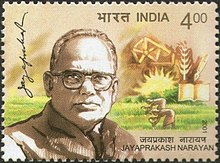Jayaprakash Narayan
Appearance

Jayaprakash Narayan (11 October 1902 – 8 October 1979), popularly referred to as JP or Lok Nayak (Hindi for The Folk Hero), was an Indian independence activist, theorist and political leader.
| This article about a political figure is a stub. You can help out with Wikiquote by expanding it! |
Quotes
[edit]- Freedom became one of the beacon lights of my life and it has remained so ever since. Freedom with the passing of years transcended the mere freedom of my country and embraced freedom of man everywhere and from every sort of trammel—above all, it meant freedom of the human personality, freedom of the mind, freedom of the spirit. This freedom has become the passion of my life and I shall not see it compromised for bread, for security, for prosperity, for the glory of the state or for anything else.
- Jayaprakash Narayan, (said at the height of the Emergency when Indira Gandhi stated that ‘food is more important than freedom’), quoted in L.K. Advani, My Country My Life (2008), also quoted at [1]
Quotes about JP
[edit]- Next day, I gave to JP my Hindi book, Samyak Sambuddha, which I had recently compiled from Buddhist classics. In its introduction I had maintained that Buddhism was only a dimension of Sanatana Dharma which I had then proceeded to define. I requested JP to read just the introduction, if he could spare the time and had the inclination. I wanted him to know what I meant by Hinduism. JP said that he liked Buddhism very much, and that he will read the whole book. I had no hope that he would. But I was pleasantly surprised when I met him after a few days. He said, "I have to seek your forgiveness (khsama chahta hun) for losing my temper that day. I did not know that you were a scholar, and had made such a deep study of Buddhism. And I have simply fallen for the beautiful (madhura) Hindi you write." I was moved to tears, and touched his feet. He continued, "If Sanatana Dharma is what you say it is, I am all for it. You can count me as a Sanatanist from today. You can say to whomsoever you please that JP has become a Sanatanist." I felt very happy. My relations with JP became more or less smooth thereafter. I thought that my Hinduism was no more a matter of suspicion in his eyes. I have told elsewhere the story of how I was able to take JP on his first ever visit to an RSS camp.
- Goel, S.R. How I became A Hindu (1982)
- PM Modi gave an example of administrative intolerance. During the last days of the Vajpayee government, it was decided to build six All India Institutes of Medical Sciences (AIIMS). The then health minister Sushma Swaraj named the Patna AIIMS Jaiprakash Narayan Institute, and similarly, the other five were also named after non-Congress national leaders. Vajpayee’s government lost the elections and the Congress-led UPA came to power. The UPA passed a Bill in Parliament and ‘banned’ these names to be used for any government project. That was the level of intolerance, he said.
- N. Modi quoted in Vivek Agnihotri - Urban Naxals The Making of Buddha in a Traffic Jam (2018, Garuda Prakashan)
- Of all the Indians speaking out for the Bengalis, the most striking name to protest was Jayaprakash Narayan. He was an elder statesman of India’s independence struggle against the British Empire, who had been uneasily won over to a tactical kind of nonviolence by Mahatma Gandhi. Narayan—known as J.P.—was a close friend of Jawaharlal Nehru, but his name is eternally linked to Indira Gandhi’s for a more tragic reason. In 1975, Narayan would challenge her rule with a mass mobilization of his supporters, and she would in response declare her notorious Emergency, suspending India’s democracy... Narayan fierily supported the Bengali guerrillas, meeting with Bengali political leaders and Mukti Bahini officers, and taking a particular interest in supplying them with arms and artillery. He demanded the defense of the “political and human rights” of the Bengalis, and decried a “holocaust” carried out by a “Hitlerian junta in power in Islamabad.”
- Jayaprakash Narayan, quoted in Bass, G. J. (2014). The Blood telegram: Nixon, Kissinger, and a forgotten genocide.

